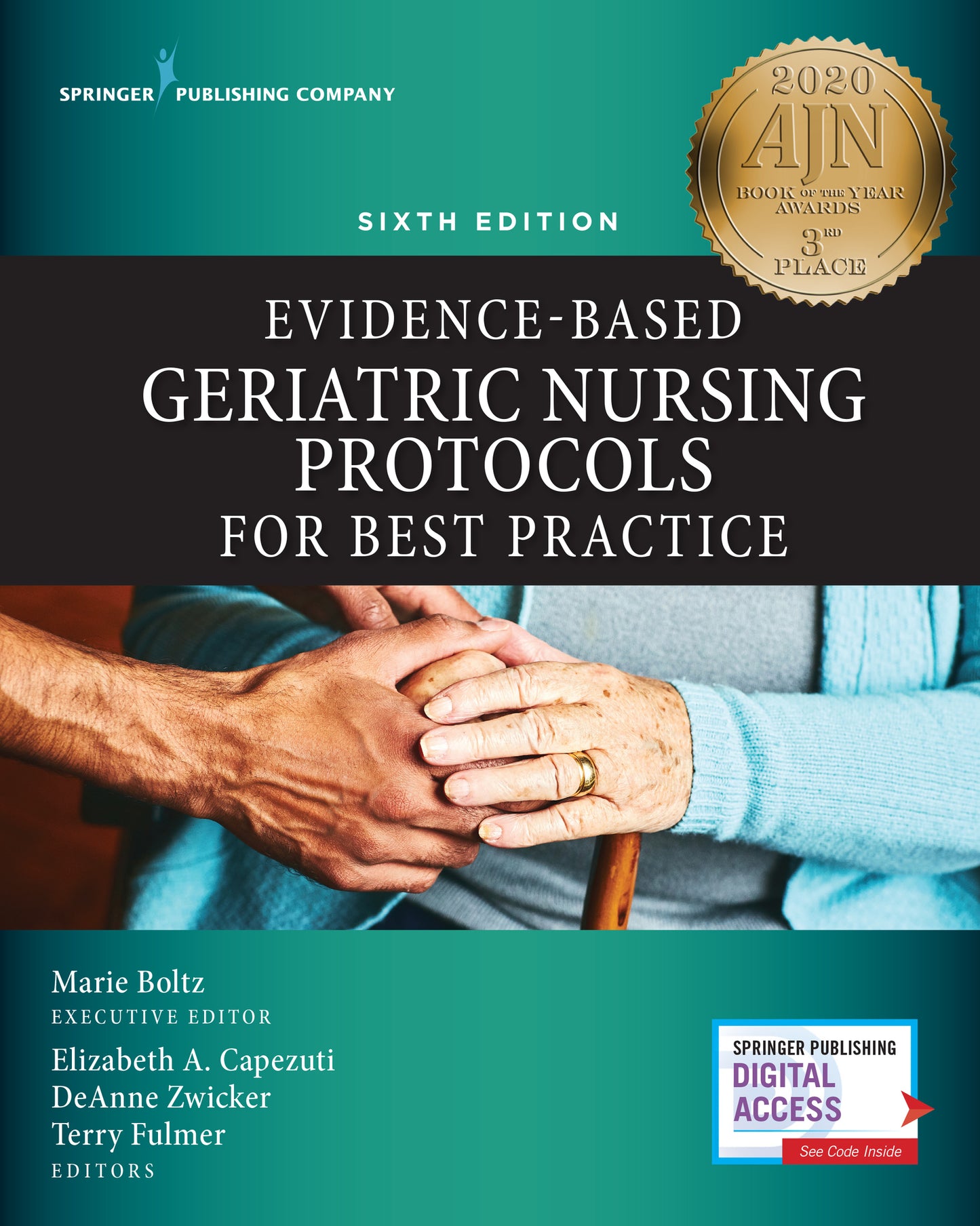We're sorry. An error has occurred
Please cancel or retry.
Evidence-Based Geriatric Nursing Protocols for Best Practice, Sixth Edition

Some error occured while loading the Quick View. Please close the Quick View and try reloading the page.
Couldn't load pickup availability
- Format:
-
27 March 2020

Note to Readers: Publisher does not guarantee quality or access to any included digital components if book is purchased through a third-party seller.
AJN Book of the Year 2016 First-Place Winner in Gerontological Nursing!
“The evidence-based protocols are designed as a primary reference and are useful, substantive, and timely....The broader contributions of useful format and succinct review of the evidence make it likely that this text will continue to be the leading resource in nursing education and practice.”
—The Gerontologist
“As a gerontological clinical educator/research nurse, I will often use this as a reference. The format and the content are good, and the explanations of how to best use the evidence simplify the process of sifting through mountains of information to figure the best practice.”
Score: 97,****
—Doody’s
The newest edition of this distinguished reference in geriatric nursing delivers updated guidelines, new illustrative case studies, and the latest evidence-based protocols developed by leading researchers, educators, and practitioners in each topic area. The sixth edition includes new approaches devoted to supporting LGBTQ+ elders, persons living with dementia and their families, and older adults living with HIV. New operational strategies provide guidance in using the electronic health record, implementing improved person-centered care approaches, and maintaining age-friendly atmospheres.
Using evidence derived from all levels of care, this text offers developed guidelines for improving both quality and outcomes when caring for older adults in multiple disciplines, including interprofessional team members, long-term care and other staff educators, social workers, dietitians, and physicians. Chapters provide assessment and management principles, clinical interventions, specialty practice, and models of care. They consistently feature chapter objectives, annotated references, evidence ratings for each protocol, and resources for further investigation. Each protocol is embedded within the chapter content to provide context and detailed evidence. The protocols consistently include an overview, evidence-based assessment, intervention strategies, and a supporting case study with discussion. PowerPoint presentations and a test bank are available as instructor’s resources.
- New Chapters:
- Informational Technology: Embedding CPGs
- Organizational Approaches to Promote Person-Centered Care
- Environmental Approaches to Support Aging-Friendly Care
- HIV Prevention and Care for the Older Adult
- LGBTQ+ Perspectives
- Key Features:
- Best practices for in-patient, in-home, and long-term care settings
- Case studies with discussions in each chapter to illustrate application of clinical practice and related Nursing Standard of Practice Protocol
- The AGREE systematic method was used to evaluate each protocol and validate this book’s content
- Instructor’s resources including PowerPoints and a Test Bank
- Purchase includes digital access for use on most mobile devices and computers


Contributors
Foreword
Preface
Acknowledgments
I. INCORPORATING EVIDENCE INTO PRACTICE
1. Developing and Evaluating Clinical Practice Guidelines: A Systematic Approach
2. Measuring Performance and Improving Quality
3. Informational Technology: Embedding Geriatric Clinical Practice Guidelines
4. Organizational Approaches to Promote Person-Centered Care
5. Environmental Approaches to Support Aging-Friendly Care
II. ASSESSMENT AND MANAGEMENT PRINCIPLES
6. Age-Related Changes in Health
7. Healthcare Decision-Making
8. Sensory Changes in the Older Adult
9. Assessing Cognitive Function in the Older Adult
10. Assessment of Physical Function in the Older Adult
11. Oral Healthcare in the Older Adult
12. Managing Oral Hydration in the Older Adult
13. Nutrition in the Older Adult
14. Family Caregiving
15. Issues Regarding Sexuality in Older Adults
16. Elder Mistreatment Detection
17. Advance Care Planning
III. CLINICAL INTERVENTIONS
18. Preventing Functional Decline in the Acute Care Setting
19. Late-Life Depression
20. Delirium: Prevention, Early Recognition, and Treatment
21. Dementia: Assessment and Care Strategies
22. Pain Management in the Older Adult
23. Assessing, Managing, and Preventing Falls in Acute Care
24. Reducing Adverse Drug Events in the Older Adult
25. Urinary Incontinence in the Older Adult
26. Prevention of Catheter-Associated Urinary Tract Infection
27. Physical Restraints and Side Rails in Acute and Critical Care Settings
28. Preventing Pressure Injuries and Skin Tears
29. Optimizing Mealtimes for Persons Living With Dementia
30. Disorders of Sleep in the Older Adult
31. The Frail Hospitalized Older Adult
32. HIV Prevention and Care for the Older Adult
33. LGBTQ Perspectives for Older Adult Care
IV. INTERVENTIONS IN SPECIALTY PRACTICE
34. Substance Misuse and Alcohol Use Disorder in the Older Adult
35. Comprehensive Assessment and Management of the Critically Ill Older Adult
36. Fluid Overload: Identifying and Managing Heart Failure Patients at Risk for Hospital Readmission
37. Cancer Assessment and Intervention Strategies in the Older Adult
38. Perioperative Care of the Older Adult
39. General Surgical Care of the Older Adult
40. Care of the Older Adult With Fragility Hip Fracture
V. MODELS OF CARE
41. Acute Care Models
42. Transitional Care
43. Palliative Care Models
44. Care of the Older Adult in the Emergency Department
Index



